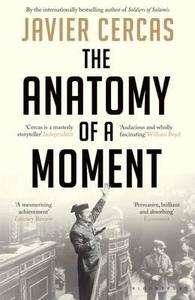The Anatomy of a Moment

Editorial Bloomsbury Publishing PLC
Fecha de edición enero 2012
Idioma inglés
EAN 9781408822104
416 páginas
Libro
encuadernado en tapa blanda
Resumen del libro
In February 1981, just as Spain was finally leaving Francos' dictatorship and during the first democratic vote in parliament for a new prime minister - Colonel Tejero and a band of right-wing soldiers burst into the Spanish parliament and began firing shots. Only three members of Congress defied the incursion and did not dive for cover,: Adolfo Suarez the then outgoing prime minister, who had steered the country away from the Franco era, Guttierez Mellado, a conservative general who had loyally served democracy, and Santiago Carillo, the head of the Communist Party, which had just been legalised. In The Anatomy of a Moment, Cercas examines a key moment in Spanish history, just as he did so successfully in his Spanish Civil War novel, Soldiers of Salamis. This is the only coup ever to have been caught on film as it was happening, which, as Cercas says, 'guaranteed both its reality and its unreality'. Every February a few seconds of the video are shown again and Spaniards congratulate themselves for standing up for democracy, but Cercas says that things were very quiet that afternoon and evening while all over Spain people stayed inside waiting for the coup to be defeated ...or to triumph.
Biografía del autor
P B Javier Cercas /B nació en Ibahernando, Cáceres, en 1962. Su obra incluye las novelas I El móvil /I , I El inquilino /I , I El vientre de la ballena /I , I Soldados de Salamina /I , I La velocidad de la luz /I , I Anatomía de un instante /I , I Las leyes de la frontera /I , I El impostor /I , I El monarca de las sombras /I y el tríptico de la Terra Alta, compuesto por I Terra Alta /I , I Independencia /I y I El castillo de Barbazul /I . Sus libros se han traducido a más de treinta idiomas y han obtenido en todo el mundo importantes galardones, entre otros el Premio Nacional en España, el Independent Foreign Fiction Prize en Reino Unido, el Grinzane Cavour en Italia, el Prix Mediterranée en Francia, el Premio de la Crítica en Chile, el Correntes d'Escritas en Portugal, el Athens European Prize for Literature en Grecia o el Taofen en China. Ha recibido, además, premios muy prestigiosos de ensayo y periodismo, y diversos reconocimientos internacionales al conjunto de su carrera.<br> P Es miembro de la Real Academia. Con I El loco de Dios en el fin del mundo /I , su libro más reciente, ha obtenido por segunda vez el Premio al Libro Europeo.<br>








